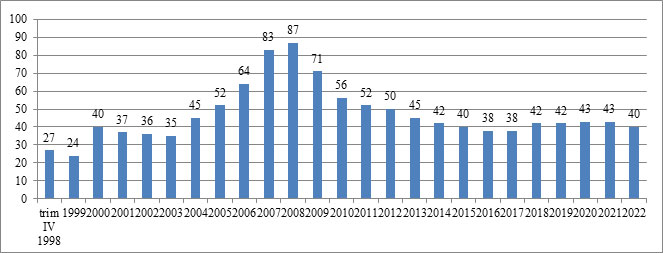Train – the mode of transport with the least impact on the environment
The option for an environmentally friendly means of transport.
Transport is responsible for about 25% of total greenhouse gas emissions, with important consequences for the sustainable development of the planet. For better information on the environmental impact produced by the use of different means of transport for journeys across Europe, the ECOPASSENGER program, developed by the International Union of Railways, launched on 24 June 2008 in Copenhagen, can be accessed on the Internet. The program allows for comparison of air, car and rail travel routes by calculating energy consumption, CO2 emissions and other pollutants (emissions of nitrogen oxides, particulate emissions, hydrocarbon emissions) for each selected route. At the same time, the program is also a recommendation for choosing the train as a means of travel, its use being the solution for reducing greenhouse gas emissions from the transport sector.
ENVIRONMENTAL POLICY
In the field of environmental protection SNTFC CFR Călători promotes an environmental policy that supports the concept that rail transport is recognized as the means of transport with the least impact on the environment.
Environmental protection activity takes place in three directions:
- 1. Compliance with legislation and other applicable requirements
- 2. Prevention of pollution
- 3. Environmental management system.
1.Compliance with legislation and other applicable requirements
Regulating the operation of environmental objectives
Environmental Authorization.
- o Obtaining environmental permits for network units;
- o Obtaining water management permits for work points;
- o Obtaining waste water evacuation acceptances in local sewerage networks;
- o Obtaining other permits / accepting agreements, opinions.
The authorization procedure for the units is a dynamic process and the authorization status periodically carries out changes, which are issued for a limited period of time.
Evolution of authorization of environmental objectives:

Compliance programs
Achieving compliance programs is:
- a condition for maintaining and reviewing environmental permits.
- Requirement to obtain authorization for environmental objectives.
Considering the specifics of depot activities and revisions, environmental balances and risk assessment studies performed, compliance programs involve extensive work:
- greening contaminated land with petroleum products, railway lines
- Decontamination of soil impregnated with petroleum substances
- rehabilitation/upgrading of fuel and oil storage facilities
- rehabilitation/modernization of sewerage networks and sewage treatment plants, rehabilitation of water cascades
- Decommissioning and greening of old fuel oil, sandstone buildings, decommissioning of oil fuel tanks and unused plant facilities, decommissioning of unused buried buildings
- restoring the waterproofing system to the diesel discharge ramp,
- Implementation of drainage and efficient collection systems for unpolluted meteoric waters
Compliance programs require a run-in period of 4-5 years and require adequate financial resources.
The allocation of financial resources is made through the proposals included in the Program of Investment Objectives and Independent Equipments with Financing from Own Funds, the Repair and Maintenance Program, as well as from Own Funds.
Monitoring environmental factors by conducting analyzes of physical and chemical indicators imposed by environmental authorizations of the company’s work points.
The environmental permits obtained following the completion of the authorization procedure, shall require by regulation the following:
- monitoring environmental factors and reporting (monthly/quarterly or annually) the results of chemical analyzes of the physicochemical indicators of pollutant emissions to the Territorial Environmental Protection Agencies
- waste management and reporting to the Territorial Environmental Protection Agencies.
In order to monitor the quality of environmental factors, according to the legislation in force, the subunits have their own monitoring programs, the analyzes being carried out in specialized environmental laboratories.
- For the year 2017 environmental monitoring services worth 96,177 thousand lei were purchased. 501 analyzes were performed, including 373 waste water analyzes, 10 drinking water analyzes, 36 groundwater analyzes, 10 pluvial water analyzes, 49 ground analysis, 20 emission analyzes and 3 noise analyzes.
Alignment with EU legislation and norms, promotion of regulations and normative acts, expression of the position of the company on draft normative acts transposing European Council directives.
- The National Reform Program on reducing greenhouse gas emissions. SNTFC CFR Călători is involved, through the Ministry of Transport, in implementing the objectives set out in this program through the following measures:
- The modernization of passenger rail transport in order to increase resource consumption and reduce GHG emissions.
- monitoring of greenhouse gas emissions and their reporting, in accordance with Decision No 280/2004/EC on a monitoring mechanism of greenhouse gas emissions within the Community and the implementation of the Protocol Kyoto.
- Implementation of the Sustainable Development Objectives of Agenda 2030 of the European Union.
- Analysis of the draft normative acts elaborated for the transposition of the European Commission Directives in the national legislation and communication to the Ministry of Transport of the point of view of the company regarding:
- Draft Report on a European Strategy for Low Carbon Mobility.
- Draft Law establishing the legal, institutional and procedural framework for the implementation of Decision No 406/2009/EC on the sharing of effort between Member States to reduce greenhouse gas emissions.
- EU Regulation on Monitoring and Reporting of GHGs.
- Government decision project on the establishment of measures for the implementation of EU Regulation 1628/2016 of the European Parliament and of the Council on the limitations of the emission of gaseous and particulate pollutants.
- Centralization and provision of data on environmental expenditures at the company level and reporting to the National Institute of Statistics through the Annual Statistical Survey Questionnaire “AS_CPM_CI-Expenditure on environmental protection in enterprises.
- Achieving the environmental status database requested by the General Management and Strategy Directorate of Transport Ministry, to elaborate by the National Environmental Protection Agency of the Annual Report on the state of the environment in Romania.
- Achieving the energy and fuel database used for traction and calculating greenhouse gas emissions and pollutant emissions into the atmosphere.
- Commitment of SNTFC “CFR Călători” on the reduction of CO2 emissions. The adhesion of the company, through the general manager, to the “UIC Declaration for Mobility and Sustainable Transport”.
SNTFC CFR Călători supports the commitment of the European Railway and Infrastructure Company (CER), in line with the European Union’s greenhouse gas reduction targets, responsible for the greenhouse effect, through an individual commitment to reduce its specific emissions of CO2 by 21% and total CO2 emissions by 31% by 2020.
Achieving the energy and gas emissions database. Calculation of total emissions based on UIC methodology. Annual submission to the Union of International Railways at the request of this forum.
-
Prevention of pollution
In 2017, works were carried out and environmental protection, pollution prevention and environmental quality improvements were carried out through the Program of Investment Objectives and Independent Equipments with Financing from Own Funds, the Repair and Maintenance Program, as well as and from own exploitation funds.
-
Environmental management system
At SNFFC “CFR CĂLĂTORI” SA was developed an Environmental Management System in accordance with the SR EN ISO 14001/2005 Standard which allows the organization to develop and implement a policy and objectives to support the internationally recognized concept, according to which rail transport is the least polluting means of transport.
| REPORT ON ENVIRONMENTAL PROTECTION for the year 2022 | Download |
| Environmental information | Download |
| Public Authorities Guide for public access to environmental information | Download |








